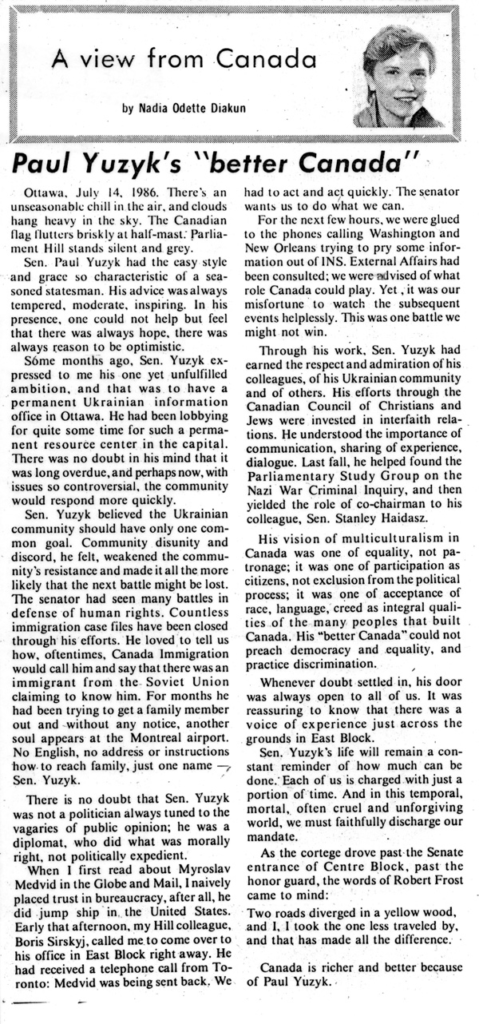Announcement by Hon. Jason Kenney
Minister of Citizenship, Immigration and Multiculturalism
Winnipeg Canadian Club, November 13, 2008 (speech excerpt)
…It is fitting that my first opportunity to speak broadly about my new portfolio comes here in Winnipeg, a city that knows the benefits of immigration and which is, in many ways, the capital of Canadian multiculturalism. It’s also a city where I spent part of my childhood …
Friends, let me tell you what an honour it is to serve as Canada’s Minister of Citizenship, Immigration, and Multiculturalism. In some ways I feel as though I am a custodian of Canada’s future.
Whenever I travel abroad, or receive foreign visitors here at home, I am struck by how enthusiastically the rest of the world sees our model of pluralism and immigration. That success is no accident. It is the result of our history, of the values rooted in that history. A history of accommodating differences in culture, language, and religion, rather than trying to impose a false conformity. And an abiding belief in values like ordered liberty, human dignity, and freedom of conscience.
Winnipeg is a classic example where, where the Red and Assiniboine Rivers meet, and names like La Verendrye, Lord Selkirk, Fr. Lafleche, and Louis Riel helped shape the future. We have learned, and benefited, from the creative tension between English and French; Aboriginal and Metis; Protestant and Catholic, differences that existed in this newest part of the new world from before the Red River Colony. It wasn’t always easy, and it certainly wasn’t always peaceful. It was, and still is, a long road. A road built by many great Canadians.
One of those great Canadians was a Winnipegger named Paul Yuzyk, the Senator for Fort Garry. Long before he was appointed to the Red Chamber by John Diefenbaker (as one of the first Parliamentarians of eastern European origin), Senator Yuzyk was a professor of history at the University of Manitoba, and the author of several books on Ukrainian history in Canada.
In 1963, when the Pearson government brought in the Royal Commission on Bilingualism and Biculturalism, Yuzyk’s was the first voice to be raised on behalf of the one-third of Canadians who were neither British nor French. In so doing, Yuzyk identified the “third force.” Yuzyk was undoubtedly inspired by the prescient words of Governor General Lord Tweedsmuir (John Buchan), who in 1936 told a Manitoba audience from the Ukrainian community that “You will all be better Canadians for being also good Ukrainians.”
Paul Yuzyk paid tribute to the French and British founding, and the Aboriginal peoples who had come before. But he added, in his maiden speech in the Senate in 1964, that “with the setting up of other ethnic groups, which now make up almost a third of the population, Canada has become multicultural in fact.” He became known as the “Father of Multiculturalism.”
Today, to perpetuate his memory, and to strengthen the vision of unity in diversity” to which he was so devoted, I am pleased to announce that the government is creating the annual Paul Yuzyk Award, which will be presented each year to an individual or organization that has demonstrated excellence in promoting the multiculturalism for which he stood.
Friends, I have recounted some of this history in order to remind us that the open, pluralistic society that we enjoy today isn’t an accident, or some recent innovation. It is a product of our history. But as we look to the future, we cannot, and must not, take for granted the success of Canada’s pluralism. Today, as we maintain historically-high levels of immigration, and as our biggest cities become increasingly diverse, we must act deliberately to maintain strong social cohesion, and a common sense of Canadian identity.
This means we must continue to adapt our idea of multiculturalism to meet today’s challenges …
NP – Senator Paul Yuzyk was the first Ukrainian Canadian appointed to the Senate of Canada. He served Canada’s Upper Chamber for 23 years until his death in 1986. Senator Yuzyk was born in 1913 in Pinto, Sask. His encountered discrimination as a young teacher in search of a teaching position, denied to him because he was a “foreigner”. This strengthened his resolve to seek recognition for non-British and Non-French Canadian citizens. In his maiden speech in the Senate, entitled “Canada: A Multicultural Nation”, he voiced the concerns of many ethnic groups that Canadians must accept the fact that Canada is not a country of two solitudes. Multiculturalism was the subject of rancorous debate until 1971, when Prime Minister Pierre Trudeau introduced the official policy of Multiculturalism in the House of Commons – provided by the Ukrainian Canadian Congress.
In 1934, Paul Yuzyk was the first national president of the Ukrainian National Youth Federation of Canada (MUNO), and he founded the Ukrainian Student’s Union of Canada (SUSK), serving as first national president in the early 1950s.







